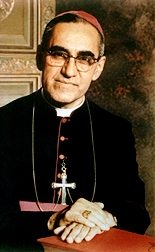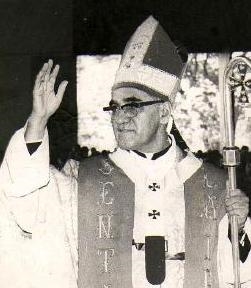 |
| Oscar Romero in religious garb (Wikipedia) |
Oscar Romero was a man of deep conviction and bold actions. He is most widely known for his actions of solidarity with the Salvadoran people against the brutal acts of injustice towards the peasant people. Romero was Archbishop of El Salvador beginning in 1977 and ending in 1980 when he was brutally assassinated during Mass on March 24th.
During civil unrest in El Salvador in the late 1970's Oscar Romero used his voice of power in the Church and in the country to speak up for the peasants of El Salvador who were being oppressed. When prominent political figures in the country told him to be quiet and to stop speaking out against these injustices, he refused, often putting his own body in between his people and their perpetrators. His defense of the Salvadoran people was very effective in protecting them from the senseless violence and oppression by the Salvadoran government.
 |
| Oscar Romero (Romero Memorial Site) |
Oscar Romero had a tremendous impact in El Salvador, in the rest of Latin America, and in the rest of the world. His passion for justice fueled a revolution in El Salvador that protected and gave a voice to the oppressed of El Salvador. Latin Americans throughout the rest of Central and South America hail Romero as a leader, a saint, and an example of how to live out one's faith in the face of tremendous injustice and conflict. Romero has also inspired leaders and people around the world to live lives that are a voice for the voiceless.
When I was in El Salvador, I attended Mass in the church where Romero was assassinated, and I later visited his house that had been converted into a memorial collage of his life. Through the pictures I saw there and people I talked to who knew him, I came to understand that Oscar Romero was a down to earth person who had a deep compassion and love for his people. This love for them led him to continually put his life and job on the line for those who did not have a voice. Oscar Romero is a hero to me because his life is a tangible example to me of what it looks like to serve Christ by giving a voice to the impoverished and oppressed.
Gray, Paul. (1990). Archbishop Oscar Romero: a Modern Martyr. Retrieved September 27, 2007, from http://www.ad2000.com.au/articles/1990/feb1990p10_653.html.
Oscar Romero. Retrieved September 27, 2007, from http://www.victorshepherd.on.ca/Heritage/Oscar%20Romero.htm.
Creighton University Collaborative Ministry Office. (2000). Remembering the Assassination of Archbishop Oscar Romero. Retrieved September 30, 2007, from http://www.creighton.edu/CollaborativeMinistry/romero.html.
Page created on 10/1/2007 12:00:00 AM
Last edited 10/1/2007 12:00:00 AM
